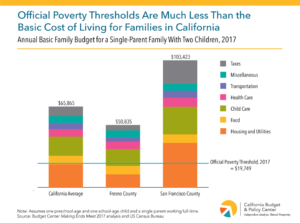Last week, the Office of Management and Budget proposed a change to how the federal government officially measures poverty. They proposed using a lower inflation measure to calculate yearly adjustments to the Federal Poverty Line (FPL), which would end up cutting billions of dollars of benefits from federal health programs and throw millions of low-income Americans off the food, shelter, and medical benefits they need to survive.
Many vital federal programs like SNAP (food stamps), school meals, and Medicare use this official poverty measure to determine eligibility and benefits. This proposed change would make millions of people – who are right on the cusp of making ends meet – ineligible for these programs.
Making Ends Meet is Already a Struggle

We know that the Federal Poverty Line is already insufficient to measure what low-income people face in our incredibly high-cost region. According to the 2019 Federal Poverty Guidelines, a family of four is impoverished if they make $25,750 a year. With Bay Area rent for one-bedroom apartments averaging around $3,000, that would mean a family would exceed their annual income just to remain housed. Changing the measure would do nothing to improve their circumstances, and in many cases would actually do great harm by making them ineligible for the services they need to survive.
Hang on, what’s the Federal Poverty Line again?
The current poverty line was created in 1963, based on 1955 consumer spending data and is updated by the Consumer Price Index in each year since. It’s worth dwelling on this for a second: the way we as a nation measure poverty is based on a 56-year-old analysis of 64-year-old data on food consumption, with no changes other than inflation adjustment. No wonder it is insufficient to capture true need in the 21st century!
Is this the only way we have to measure who is poor in America?
It has long been understood that the FPL is incomplete and outdated. If the Office of Management and Budget wants to look at a revised definition of poverty, it should take a look at the Supplemental Poverty Measure created by The Bureau of the Census. It does a much more thorough job estimating poverty using multiple income sources (including SNAP and tax credits) and taking into account a full range of household expenditures like housing, child care, and medical expenses.
What can we do about it?
You can submit a comment to the Office of Management and Budget here before the deadline of June 21st. Our friends at the Coalition for Human Needs have created an easy step-by-step guide to help you submit your comment.
Thank you for continuing to join us in pushing for an end to hunger and poverty in San Francisco and Marin!


Share